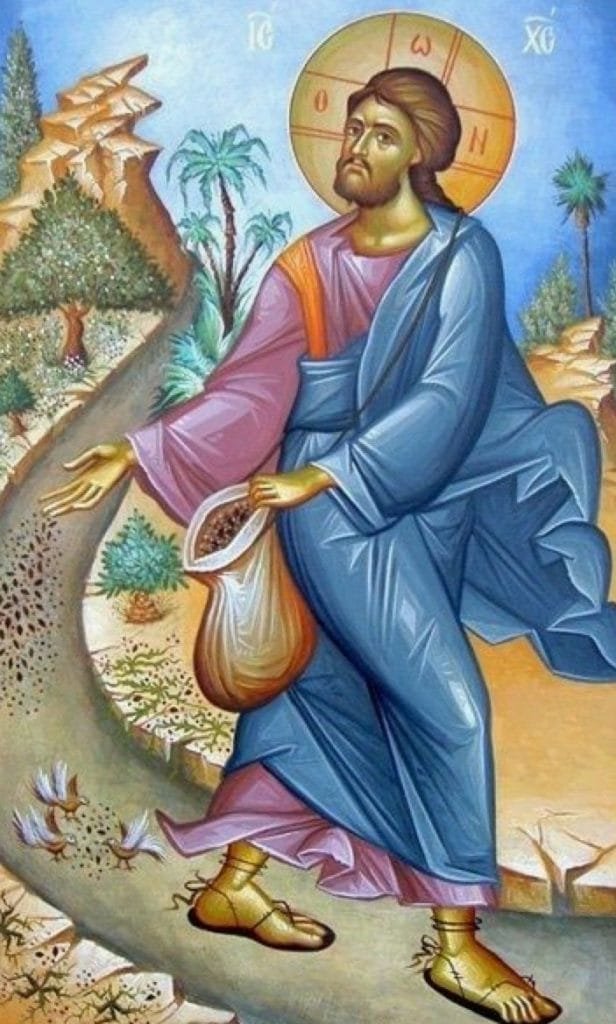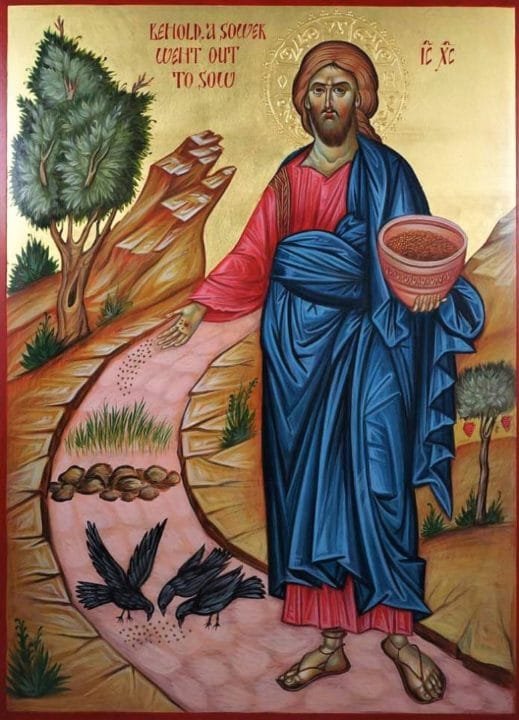HOMILY FOR THE 15TH SUNDAY IN ORDINARY TIME YEAR A (July 16, 2023)
IS OUR HEART A GOOD SOIL FOR GOD’S WORD TO GROW?
1. Summary of today’s 15th Sunday in Ordinary Time year A readings.

In the first reading, the rain, which helps plants grow, is compared to the Word that comes from God’s mouth. This Word is Jesus Christ, and it is spread through preaching (Gospel). It will fulfill God’s desire and carry out His plan.
- Do we hear it without really paying attention and not make an effort to comprehend it?
- Do we grasp it and delve into its understanding and are we consistent in following it?
- Or when faced with challenges, or our excessive longing for riches, do we tend to forget about it and give up on it completely?
Let’s remember that by living according to the teachings of the Gospel, we will experience the complete freedom that comes from being children of God (2nd reading).
2. Is our heart a good soil in which God’s word could grow and bear fruit?
Today’s 15th Sunday in Ordinary Time year A Gospel recounts the Parable of the sower (Mt 13: 1-23). Jesus is both the sower and the seed which is God’s Word.
- For this seed to germinate, grow and bear fruit, it must be sown in a fertile ground: “The seed that falls on good ground will yield a fruitful harvest (Resp. Psalm).”
The 4 types of terrain where the seed is sowed represent our dispositions upon accepting God’s Word, which as we said earlier, is Jesus Himself, his teachings and His Church.
God cannot save us if we do not correspond to his grace and put our own part and hence the necessity of having the proper dispositions so that God’s grace would bear fruit in us.

- The 4 types of terrain: the 1st 3 are unproductive: path, stones, thorns, the last is a good ground, a fertile soil
- “The seed fallen on the path stands for those who hear the message of the Kingdom of God but do not understand it; thus the evil one comes and snatches it away. Indeed, the evil one does not want the seed of the Gospel to sprout in the heart of man…
- The second is that of the seed fallen among the stones: this represents the people who hear the word of God and understand it immediately, but superficially, because they have no roots and they are unsettled; and when trials and tribulations arise, these people give up immediately.
- The third case is that of the seed fallen among the bushes with thorns: Jesus explains that this refers to the people who hear the word but they, because of the cares of the world and the seduction of riches, are choked.
- Finally, the seed fallen on fertile soil represents those who hear the word, accept it, cherish it and understand it, and they bear fruit. The perfect model of this good soil is the Virgin Mary. (Pope Francis, Angelus address, July 13, 2014).”
- The enemies of Jesus’ presence in our heart and life: ignorance (devil); superficial understanding (trials and tribulations), indifference (worldliness).
- All these may lead to the seed of God’s word to germinate but it will eventually, or wither and die, or be carried away by the winds of frivolity, materialism and hedonism all of which can be summarized in one word: wordliness.
- What does it mean to be worldly? One is considered worldly when they only focus on money, possessions, pleasure, and comfort, making these things their top priority in life. They live for themselves and for the world, without making time or space for thinking about God. They might believe that they are too busy and have more important matters to attend to.
- Jesus reminds us that we must always strive to have good dispositions, being docile to His Word, put our own part, if His life were to grow and bear fruit in us.
Pope Francis presents to us the following questions: “how is our heart? Which soil does it resemble: that of the path, the rocks, the thorns? It’s up to us to become good soil with neither thorns nor stones, but tilled and cultivated with care, so it may bear good fruit for us and for our brothers and sisters. (Pope Francis, Angelus address, July 13, 2014).”
Let us ask ourselves if we live for God, or if we live for the world and for ourselves. Let us also ourselves: what have we done to make God’s Word bear fruit in our life?
- Am I a Catholic who actively practices my faith and loves God, or am I simply someone who attends church on Sundays, or even worse, just identify as a Catholic without truly living out my beliefs? Do I truly understand and put into action the teachings of Jesus as found in the Gospels and passed down by the Catholic Church?
- Let’s remember that for a plant to grow, it needs to be watered, cared for, and protected from bugs or diseases. To practice our faith, we must nurture it. It’s not enough to rely solely on what we learned during our First Holy Communion. We need to continually deepen our understanding through prayer, the sacraments, and ongoing education, in order to live our faith well. As St. Jerome once said: If we are ignorant of Scripture, we are ignorant of Christ. And we can expand on that: If we are ignorant of our Catholic doctrine and faith, we are ignorant of Christ, our salvation, and our true happiness.
- It is really up to us to correspond to what God had sown in our heart.

“And it will do us good not to forget that we too are sowers. God sows good seed, and here too we can also ask ourselves: which type of seed comes out of our heart and our mouth? Our words can do much good and also much harm; they can heal and they can wound; they can encourage and they can dishearten. Remember: what counts is not what goes in but what comes out of the mouth and of the heart. (Pope Francis, Angelus address, July 13, 2014).”
- We are sowers because of God’s grace. People rely on us. Do we make an effort to teach others about the faith through our prayer, actions, and words? Our words and actions have the power to do both good and harm; they can build up or cause scandal; they can inspire or discourage; they can bring souls closer to Christ or push them away.
Dear brethren in Christ, let us ask God, through the intercession of Mother Mary of Mount Carmel, “the perfect model of the good soil,” and St. Joseph, the master of interior life.
- so that we may have the proper dispositions to receive God’s grace through His Church and His instruments,
- to make it grow through prayer, sacraments and formation;
- to put them into practice so as bear fruits of holiness and apostolate,
- and only then could we arrive at the glory of the freedom of the children of God.
A Blessed Sunday and week ahead!
Fr. Rolly Arjonillo
SEE AS WELL:
Stay updated: subscribe by email for free TO OUR NEW WEBSITE www.catholicsstrivingforholiness.org (PUT YOUR EMAIL IN THE SUBSCRIBE WIDGET).
We are also in www.fb.com/Catholicsstrivingforholiness. Kindly help more people in their Christian life by liking our page and inviting your family, friends and relatives to do so as well. Thanks in advance and God bless you and your loved ones! Fr. Rolly Arjonillo

